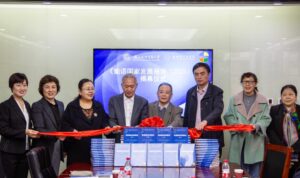
Meet five Gen.T honourees who are changing the game with their innovative tech startups
Singapore is ranked among the top 12 startup ecosystems globally. It also has the world’s top talent pool for new companies, overtaking Silicon Valley as the number-one location for startup talent in 2017. Thanks to a private sector eager to finance fresh ideas, as well as a high level of governmental support, the island nation is continuing to grow as a major entrepreneurial hotspot.
GOVERNMENT SUPPORT
Over the past few years the Singaporean government has rolled out a number of funding opportunities, incentives and grants for budding entrepreneurs, ranging from reduced corporate tax rates and business expansion grants to government investments—all of which aim to ensure the country is seen as an increasingly attractive base of operations for startups that operate across APAC.
“The range of industries—from tech and fashion to transport and logistics—spoke well of the vibrancy of our startup scene,” said Singaporean prime minister Lee Hsien Loong during a lunch with major startup founders based in Singapore earlier this year. “We are growing a strong startup ecosystem and will continue to find new and innovative ways to support local businesses.”
PRIVATE CAPITAL AND A CAN-DO SPIRIT
Venture investments in Singapore are also continuing to grow, especially in early-stage, deep tech startups. A total of US$9.6 billion was invested into local startups over the first three quarters of 2019—a 36 percent increase from 2018.
The systemic support in place for Singaporean entrepreneurs means more young people than ever want to launch their own company. According to a survey by website building platform GoDaddy, 74 percent of Singaporean Millennials are working towards becoming their own boss or self-employed in the next decade—compared to a global average of 50 percent.
FEAR OF FAILURE
Despite the well-established startup ecosystem in the country, a reported 30 percent of Singaporean startups still fail within the first three years. There are a number of factors at play as to why, including stress and the stigma surrounding failing. Gen.T honouree Khailee Ng of 500 Startups spoke to Today Online about the high stress levels entrepreneurs face, which oftentimes isn’t openly discussed with investors or co-founders. Harvard Business School attributes 65 percent of startup failures worldwide to personal stress, and Singapore is no different.
“That’s the main problem with schools here, [where] students here are taught not to fail,” said Michael Teng, CEO of Singapore Innovation & Productivity Institute (SiPi). “Society doesn’t give you a second chance, so there’s a real fear of failure.”
Here are five Singaporean tech entrepreneurs from the Gen.T List who have overcome the fear of failure and built some of the region’s most valuable startups.
Henry Chan
Company ShopBack, an online shopping cash back rewards programme available across Asia Pacific.
Founded 2014.
Co-founder ShopBack was co-founded with fellow Gen.T honouree Joel Leong.
Need To Know The platform now has over 5 million users.
Quote Chan looks up to tech entrepreneur Elon Musk, and says his definition of success is tied to eventually becoming a “problem-solver, entrepreneur, husband and father, with a self-driving Tesla car”.
Did You Know? Chan credits ShopBack’s achievements to “killer team execution”. ShopBack has now helped consumers save more than $15 million in cash back, and boasts a usage rate of at least one order every three seconds.
What’s Next? ShopBack expanded to Australia in 2017, and has 300,000 registered users in the country. Now the founders are setting their sights on Vietnam. “We could expand beyond [Asia Pacific] but we have a fair bit on our plate, right now,” Chan told TechCrunch in 2019.
Tan Hooi Ling
Company Grab, a multinational ride-hailing company that provides transportation, food delivery and digital payment services.
Founded 2012.
Co-founders Grab was co-founded with fellow Gen.T honouree Anthony Tan.
Did You Know? Grab recently launched GrabMerchant, a business-to-business programme to help small companies in Southeast Asia move online, digitalise and manage their businesses. Merchants don’t need to pay to use the platform.
Quote Hiring the right people can make or break a startup, says Tan. “It is the only reason why we are where we are today,” she said. “Because to be frank and honest, [Anthony Tan] and I… are oftentimes not the smartest people in the room, and we love that.”
What’s Next? In February 2020 Grab announced that it had raised US$856 million in additional funding from strategic Japanese investors, with the aim of growing the other arms of Grab’s business in payments and financial services.
Quek Siu Rui
Company Carousell, an online consumer-to-consumer marketplace for buying and selling second-hand goods.
Founded 2014.
Co-founders Gen.T honourees Lucas Ngoo and Marcus Tan.
Did You Know? The first item sold on Carousell was an Amazon Kindle e-reader for US$54
Quote The trio were inspired to start their own business after an internship in Silicon Valley. “We got so inspired by heroes like Jack Dorsey, Mark Zuckerberg, Drew Houston of Dropbox. The one commonality all of them had was just this whole fascination for using technology to solve problems and make a big impact,” says Quek.
Need To Know In 2018, the co-founders turned down a US$100 million offer for their business, as they were determined to make a success of it on their own.
What’s Next? CNBC reports that analysts believe Carousell to be “one of Southeast Asia’s next $1 billion unicorns.”
Annabelle Kwok
Company NeuralBay, an artificial intelligence company that specialises in vision analytics software.
Founded 2017.
Did You Know? NeuralBay’s consultancy arm works with clients to customise software for their businesses, which could range from capturing analytics on how well window displays spur customer engagement, to detecting suspicious body postures at high-security facilities. The startup was recently acquired by a global insurance brand.
Need To Know Kwok also founded another startup, SmartCow. One of Singapore’s leading hardware companies, SmartCow builds industrial-grade hardware for artificial intelligence processes, allowing users to apply more efficient computing and learning methods to their network traffic.
Quote “I know I’m just a 25-year‑old, but I see these [invitations to speak at conferences] as affirmation that I’m doing things right and a reminder of my responsibility to keep improving with each achievement.”
Chua U-Zyn
Company Zynesis, a blockchain research and development lab and consultancy.
Founded 2007.
Need To Know Zynesis have been building, developing and contributing to the blockchain ecosystem, especially Bitcoin, Ethereum & Dash for years, and they now work with a variety of governmental organisations, including the Singapore Ministry of Defence.
Quote “If the Internet had been controlled by an authority, and anytime somebody wanted to start an ecommerce business he had to apply for a license, then it would not be as successful as it is today.”
Did You Know? U-Zyn also founded Cake DeFi, a platform that harnesses the potential of decentralised finance, alongside fellow Gen.T honouree Julian Hosp.

